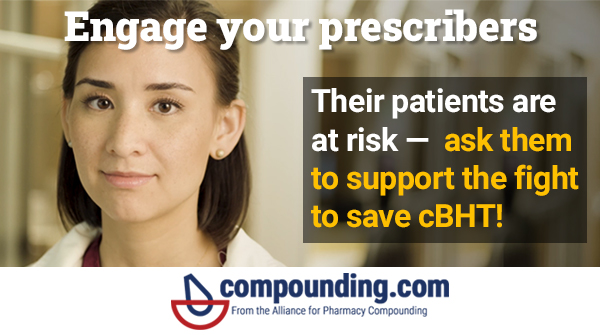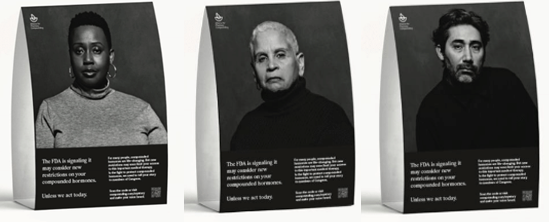
The voice for pharmacy compounding | May 14, 2021
Dear A4PC,
This marks the umpteenth edition of Compounding Connections in which we mention the need to raise $1.5 million to fund APC’s cBHT media campaign. I’m betting you’re aware of it, aware that we’ve raised about $950,000 so far. What you may not be aware of:
- The balance of $550,000 is needed for funding the actual ad placements to drive patients to tell their stories at compounding.com
- We need it before the end of June or the campaign grinds to a halt.
If you’ve given, we’re grateful. But more is needed. If you compound hormones but you have not yet given, it’s time to do your part and invest – to protect your profession and your patients. All it takes is two minutes and a credit card here.
Thank you,
Scott Brunner, CAE
Chief Executive Officer
From APC’s President
Lichen what we're doing

Michael Blaire, RPh, FIACP
APC President
I was lying in bed and relaxing one Sunday morning when my wife came in and said, "Let's go for a hike."
"No," I said, "I'm lying in bed and relaxing."
"It will make you feel good," she insisted.
"What part of lying in bed and relaxing doesn't feel good?" I asked, with no plans to move an inch.
So we were hiking up Sunrise Trail when we noticed something that looked like yellow paint on the side of a rock. On closer inspection we realized it was a lichen.
A lichen is a composite organism that emerges from algae or cyanobacteria living among the filaments of a fungus in a mutually beneficial symbiotic relationship. The fungi benefit from the carbohydrates produced by the algae or cyanobacteria via photosynthesis. The algae or cyanobacteria benefit by being protected from the environment by the filaments of the fungi, which also gather moisture and nutrients from the environment, and (usually) provide an anchor to it.

Lichens cover about seven percent of the Earth's surface. They are found in some of the most extreme environments on the planet, from scorching desert to frozen arctic tundra. They are incredibly durable. The key to their survival: Both organisms contribute to the arrangement, and both benefit from it.
The relationship APC maintains with our Corporate Patrons is similar to the lichen’s. APC's corporate programs allow suppliers, service providers, and others with an interest in compounding pharmacy to increase and leverage their influence and to amplify APC's effectiveness as the voice for pharmacy compounding.
While APC provides a platform by which our Corporate Patrons can effectively and efficiently communicate and build relationships with our membership, those partners provide goods and services to our members and support to our association.
Of course, these relationships could be developed independently, just as algae and fungi can live independently. However, when separated, algae and fungi become limited to the types of environments they can survive in, and their longevity decreases sharply.
APC is fortunate to have a wonderful group of Corporate Patrons, and we are thankful for them. With all of the projects your association has going on this year, we need the support of our corporate partners more than ever. Whether it is investing in a Platinum level sponsorship or buying a banner ad in Compounding Connections, it all helps. And you can help by patronizing those companies that support your association. It's a win-win situation.
Lichens are long-lived, with some considered to be among the oldest living organisms. An Arctic species called "map lichen" has been dated at 8,600 years, apparently the world's oldest living organism. Imagine that kind of longevity for your business and your association. If that doesn't make you feel good, you can go take a hike.
Editor's note: Only a scientist could refer to our corporate patrons as fungi and mean it affectionately.
Michael Blaire is APC’s president, but his day job is vice president for government and regulatory affairs at Wedgewood Pharmacy in Scottsdale, Arizona. You can reach him at mblaire@wedgewoodpharmacy.com.

This Week

Share your prescriber list (pretty please?!)
APC is working on a lot of fronts, and there's a large group of people who can not only help our efforts, but benefit from them as well: prescribers. Simply put, we want to reach out to more of them — to engage and educate them, and, of course, to ask for their support.
We need your help to reach them. In short, we would like you to send us, confidentially, of course, a list of the prescribers you work with.
We will not sell or share this information in any way — it is solely for APC to use to get support from prescribing practitioners and clinics. (For the legal details of this, please read the full confidentiality statement.)
We understand that different record-keeping systems output their data differently, so we aren't picky. The perfect format would be an Excel or CSV spreadsheet that includes the following information:
- Prescribers' names
- Full mailing addresses
- Phone numbers
- Fax numbers
- Email addresses
Simply email the file to info@a4pc.org (and note in the subject line that it's a prescriber listing).
Thank you for your help. The more prescribers we can reach, the stronger the association becomes, and the more we can accomplish for you and your patients.

Wanted: cBHT bloggers — er, columnists
We're looking for expert voices about cBHT — folks with some solid insight into the use of compounded hormones — to write columns on compounding.com. To be clear, this is more than just discussing the big picture, or expressing concern about potential FDA action (we've got that part covered). We want expert opinion, first-hand testimonials, and a professional voice that will resonate with patients and policy makers.
If you've got a flair for writing and making your case, we would love to have you write — once, occasionally, or even regularly — on compounding.com.
Applying is informal: Just drop a message to Scott Brunner at scott@a4pc.org, make your case, and share something you've written.
FDA announces June PCAC meeting
FDA will be holding a virtual meeting of its Pharmacy Compounding Advisory Committee, open to the public, on Wednesday, June 9, 2021, from 10:00 am to 5:05 pm EDT.
Agenda: "The committee will discuss the following four bulk drug substances nominated for inclusion on the 503A Bulks List: Choline chloride, oxitriptan (also known as 5-hydroxytryptophan or 5-HTP), melatonin, and methylcobalamin." It will also discuss adding neomycin sulfate to the Withdrawn or Removed List.
You can find more information on the announcement page, and you can submit comments on the meeting (by June 8, 2021) — follow the instructions on Regulations.gov.
APC will be developing input for the committee on at least two of the nominated substances. If you have suggestions, please direct them to scott@a4pc.org.
Yet another reminder: How to save cBHT
Learn the threat to compounded hormones. Find out more at compounding.com about the bad science in the now-debunked NASEM report.
Recruit your patients and prescribers to help save cBHT. Explain the issue and direct them to compounding.com where they can share their stories — stories that can make a difference with policy makers. (We've got the members-only tools to help you reach out at A4PC.org/cbhttools.)
Give to save cBHT. Saving compounded hormone therapy is the biggest — and most expensive — initiative in APC's history. We are still well short of raising the funds needed to place the targeted ads we've created across the country. Help us fund this effort by contributing at A4PC.org/cbhtcampaign.
Together is how we're going to save compounded hormone therapy!

The survey is over, and we have a winner (besides APC)
Congratulations to Nira Nikunj Kadakia, assistant professor of teaching in pharmacy practice at Ohio's University of Findlay, winner of the 64GB iPad Mini — she was one of almost 750 people who took our 10-minute Pharmacy Compounder Profile survey.
As that name suggests, we’ll be using those responses to create a nationwide profile of pharmacy compounding, due out in late summer or early autumn. That profile in turn will help APC’s advocacy efforts on your behalf. Thank you to everyone who took the time to respond!
Coming Up
May 25 — APC CE: Online Pharmacy Sales Credentialing: Nice Work if You Can Get It
June 10–11 — PCCA ACT Conference (virtual)
June 16–17 — Informa Connect's Compounding Pharmacy Compliance Virtual (APC members: Use code APC10 for 10% off registration!)
July 13 — APC CE: Reading a Certificate of Analysis: Calculations Based on C of A Data
September 14–15 — Compounders on Capitol Hill (mark your calendars!)
September 22–24 — Informa Connect's Compounding Pharmacy Compliance East
Short Takes
The public is losing trust in health agencies. A recent poll found that only 37% of Americans have a great deal of trust in the FDA. The CDC did better (52%) and HHS did worse (33%) but overall both state and federal agencies are suffering from a lack of public trust. The poll doesn't ask details, but there is a clear political divide; "27% of Republicans greatly trust CDC, compared to 76% of Democrats."
Maryland is looking for a pharmacist to serve on the state's Naturopathic Doctors Formulary Council. A background in pharmocognosy is preferred, and practicing in Maryland is required. Application deadline is noon on Friday, May 21, 2021.
The Senate Finance Committee will hold a hearing on "Covid-19 Health Care Flexibilities" e.g., telehealth. It's this coming Wednesday, May 19 at 10:00 am EDT. Click here for info.
Weird statin stat: A study of the records of almost 11,000 patients found that prescribers prescribe fewer statins as the day goes on. And we’re not just talking early morning vs. late afternoon: "[C]ompared with patients who came in at 8:00 am, patients who came in at 9:00 am were 12% less likely to get a prescription. Patients coming in for noon appointments were 37% less likely to get a statin prescription."










